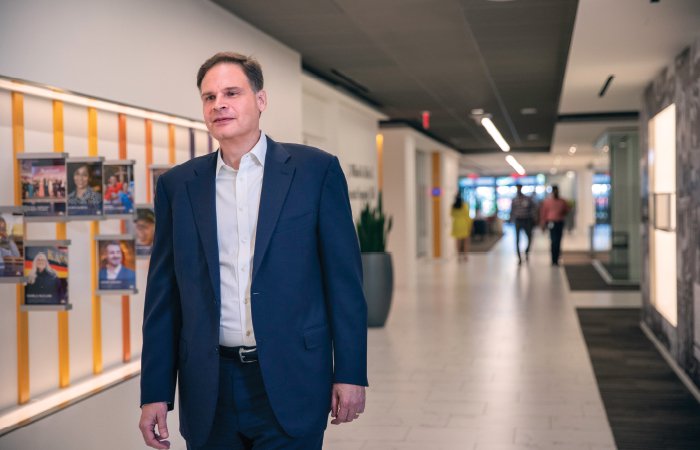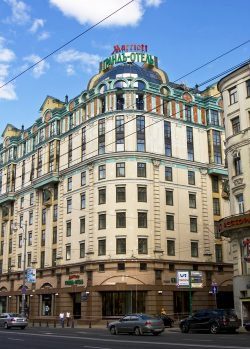Marriott International: Employee wellbeing at the heart
- Andrew R. McIlvaine

At 21 stories, the new headquarters for Marriott International, currently under construction, will be the tallest building in the Washington suburb of Bethesda. The top floor will feature sweeping views of the US. Capitol Dome and the Washington Monument to the south and, to the northwest, the rolling hills of western Maryland.
At most companies, a prime aery such as this would be reserved for members of the C-suite. But, in this case, once Marriott moves into the new building (sometime in 2022), the 21st floor will become home to its state-of-the-art employee-learning centre.
The symbolism matters deeply, says David Rodriguez, the hospitality company’s global Chief HR Officer and this year’s HR Executive of the Year (as judged by HR Executive magazine in the US).
“It underscores our belief that the future success of our business is completely dependent on the extent to which we’re promoting our associates’ wellbeing and that they’re inspired,” he says.

Marriott, which acquired Starwood Hotels for $13 billion in 2016, is the largest hospitality company in the world. More than 700,000 employees in 130 countries and territories wear a Marriott name badge. The company’s 30 hotel brands include St. Regis, Ritz-Carlton, SpringHill Suites, and Courtyard by Marriott.
Yet, even more than its sheer size, Marriott — which started in 1927 as an A&W root beer stand operated by founders J. Willard and Alice Marriott — is known for its stellar reputation as a place to work. The company has made Fortune’s “100 Best Companies to Work For” list for a record 22 consecutive years. It’s also routinely featured on other “best places” lists, including “Best Places to Work for Veterans” (Indeed), “Best Companies for Latinas to Work for in the US” (Latina Style magazine) and “Leading Disability Employers” (National Organisation on Disability), to name a few.
Beginning with its founders, who hired a company doctor in the 1930s to help look after employees as the business expanded, Marriott has long been known as a standout for prioritising its workers’ wellbeing. Rodriguez, who joined Marriott in 1998 and has held his current position since 2006, is widely credited not only with maintaining but enhancing that reputation, while making the company ever-more welcoming to people from diverse backgrounds.
Culturally one-of-a-kind
At Marriott, leaders have helped advance a culture that’s unique from most other large corporations, says Rodriguez.
“I started my career as a low-level manager at a big financial-services company,” he says. “For employees at my level, there was this drab cafeteria where the meals weren’t subsidised at all. For mid-level managers, there was a separate cafeteria where the meals were partially subsidised. And, for the top executives, there was a really nice dining room on a top floor with chandeliers, white tablecloths, waiter service and 100% subsidised meals.”
At Marriott, by contrast, (Executive Chairman) Bill Marriott is often seen standing in line holding a tray at the employee cafeteria, encouraging others to go before him, says Rodriguez. “He’ll get his food and then sit down at a table and talk with employees.”
That selfless attitude cascades down throughout the workforce, but is helped along by a number of key culture-building initiatives.
Marriott’s TakeCare programme, for example, also builds on the relationship between the company and its associates, encouraging them to be invested in their own wellbeing and that of others. TakeCare includes fitness events and challenges, financial-wellness tools, emotional health, career-development training, and opportunities for community involvement.
More than 15,000 employees around the world have volunteered to serve as TakeCare “ambassadors,” helping to spread the word about the programme and build enthusiasm.
“These days, pretty much everyone feels disconnected and dissatisfied with almost every institution surrounding them — with the exception of their employers,” says Rodriguez. “We spend a huge portion of our lives with our employer. That’s why this notion of promoting employee wellbeing is so important — you’re literally partners with your employees’ life partners.”
Unlike most traditional wellness programmes, TakeCare is built on taking a holistic approach to help employees feel good about themselves, foster relationships within the company, and build a sense of purpose about Marriott’s role in society, he says. It includes the TakeCare Relief Fund, which makes need-based financial grants to Marriott employees around the world who’ve encountered personal hardship or natural disasters.
In 2018 alone, the programme awarded over US$400,000 in grants and provided $1.7 million in donations. “In the service industry, you’re only as good as the wellbeing of your people,” says Rodriguez.
To that point, last year the American Psychological Association named the company the recipient of its 2018 Organisational Excellence Award for its comprehensive training and development efforts.
Celebrating Different Cultures
Given its status as a global hospitality provider, with properties in 130 countries and territories around the world, “cultural competence” is central to Marriott’s business.
Rodriguez greenlighted the company’s “Culture Days” immersive initiative, which is designed to help employees experience and appreciate different business and social protocols, traditions, trends and cuisines.
The initiative isn’t simply for altruistic reasons — ensuring that employees respect and understand other cultures is a bottom-line issue, as well. Indian weddings, for example (which typically feature large numbers of guests), have become big business for some of Marriott’s properties. More than 3.5 million people from Japan visit the US annually, while Chinese visitors spend an average of US$6,900 on their visits to Marriott’s home market.
With Culture Days, employees learn the proper way to present and accept business cards with guests from different regions of Asia, including Singapore. They learn about major world holidays, such as Ramadan.
The training is often based on actual scenarios that have taken place at Marriott properties and encompasses more than global cultures — employees are also trained on the various sensitivities affecting military or LGBTQ families, or people from urban and rural areas.
“Could you imagine somebody in the US telling somebody in India or Japan, ‘This is how you behave; this is your core value’?” Rodriguez asks. “Businesses do it all the time. I think it should be the opposite. You state, ‘Here’s what we stand for,’ and let employees express that in a way that’s culturally relevant to them.
“That way, you’ll never have to worry about your culture going stale.”
Pioneering recruitment trends
With over 700,000 staff across the world, talent acquisition is a big part of the Chief HR Officer’s remit. On this front, Rodriguez has been a pioneer in using social media. Marriott was among the first hospitality companies to use a chatbot to connect with candidates.
“For some of our roles, we’re competing for the same talent that Amazon and Google are,” he says. “My job is to take our great story and make it available to the public.”
This includes “Master of the Craft,” a series of multimedia events that spotlight the work being done by chefs and mixologists in Marriott’s kitchens and bars.
“We’re one of the largest purveyors of food and beverages,” says Rodriguez. The content highlighted on Master of the Craft and in a series called #DiaryOfTheCraft showcases the company to top talent in the field.
The series has garnered more than 2 million video-content views and over 14 million social impressions.






